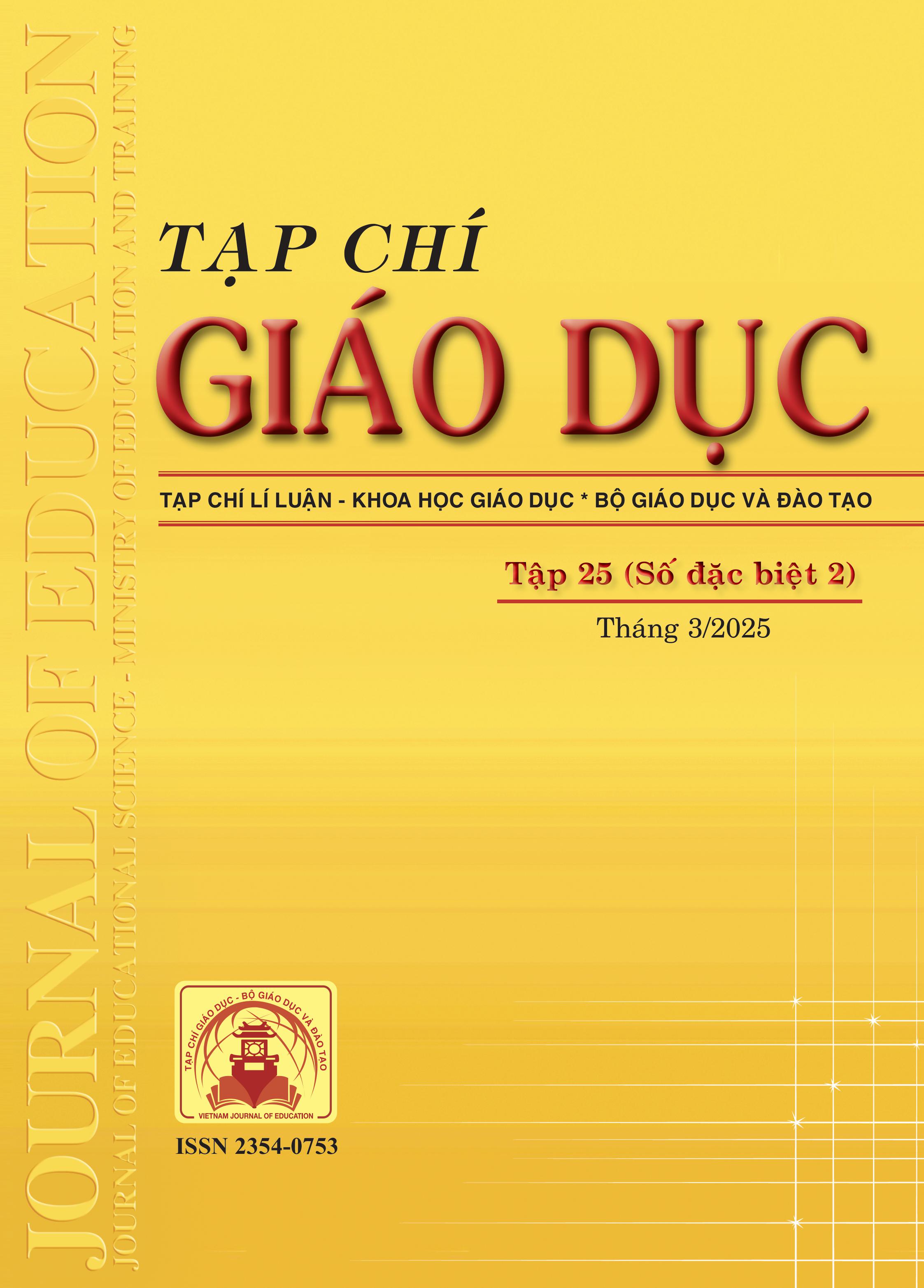Xây dựng kế hoạch bài học STEM môn Sinh học nhằm phát triển năng lực nghiên cứu khoa học cho học sinh trung học phổ thông
Tóm tắt
Forming and developing students' scientific research competence plays an important role, meeting the teaching objectives in the direction of developing students' competence in the context of current educational innovation. In Vietnam, STEM education has been officially included in the 2018 General Education Program to contribute to the implementation of the goal of educational innovation and training, helping students develop logical thinking and equipping them with necessary skills in the digital age. In this study, we introduce some basic concepts related to STEM and STEM education; scientific research competence; propose a process for developing a Biology lesson plan in the direction of STEM education to develop scientific research capacity for high school students and illustrate this process in developing a lesson plan “Research on the application of microorganisms in bread production” (Biology 10). Through STEM lessons, students not only form and develop STEM competencies but also form and develop other core competencies, including scientific research competencies.
Tài liệu tham khảo
Bộ GD-ĐT (2018a). Chương trình giáo dục phổ thông - Chương trình tổng thể (ban hành kèm theo Thông tư số 32/2018/TT-BGDĐT ngày 26/12/2018 của Bộ trưởng Bộ GD-ĐT).
Bộ GD-ĐT (2018b). Chương trình giáo dục phổ thông môn Sinh học (ban hành kèm theo Thông tư số 32/2018/TT BGDĐT ngày 26/12/2018 của Bộ trưởng Bộ GD-ĐT).
Bộ GD-ĐT (2020). Công văn số 3089/BGDĐT-GDTrH ngày 14/8/2020 về việc triển khai thực hiện giáo dục STEM trong giáo dục trung học.
Breiner, J. M., Harkness, S. S., Johnson, C. C., & Koehler, C. M. (2012). What Is STEM? A Discussion About Conceptions of STEM in Education and Partnerships. School Science and Mathematics, 112(1), 3-11. https://doi.org/10.1111/j.1949-8594.2011.00109
Froyd, E. J. (2020). Refections of an Engineering Education Scholar on Integrated Approaches to STEM Education. Springer
Nature Switzerland AG. Hsu, Y. S., & Yeh, Y. F. (2019). Asia-pacific STEM teaching practices: From theoretical frameworks to practices. In Asia-Pacific STEM Teaching Practices: From Theoretical Frameworks to Practices. https://doi.org/10.1007/ 978-981-15-0768-7
Lê Thanh Hà, Phan Thị Thanh Hội (2021). Lược sử nghiên cứu giáo dục STEM ở một số nước trên thế giới và Việt Nam. Tạp chí Khoa học, Trường Đại học Sư phạm Hà Nội, 66(2), 220-230.
Mertler, C. A. (2016). Introduction to educational research. First edition. Thousand Oaks, California, SAGE Publications, Inc.
Nguyễn Thị Trang (2019). Phát triển năng lực nghiên cứu khoa học giáo dục cho sinh viên đại học sư phạm. Luận án tiến sĩ Khoa học Giáo dục, Trường Đại học Sư phạm Hà Nội.
Nguyễn Văn Hồng, Bùi Thị Minh Thu (2019). Xây dựng cấu trúc và tiêu chí đánh giá năng lực của học sinh trong dạy học Sinh học theo tiếp cận cấu trúc. Tạp chí Giáo dục, số đặc biệt kì 3 tháng 5, 230-236.
Phạm Thị Hồng Tú, Ngọc Mạnh Huân (2019). Thiết kế và tổ chức dạy học chủ đề “Sinh trưởng của vi sinh vật - nhân giống nấm men” (Sinh học 10) theo định hướng giáo dục STEM cho học sinh hệ giáo dục thường xuyên. Tạp chí Giáo dục, 450, 48-56.
Sanders, M. (2009). STEM, STEM Education, STEMmania. Technology Teacher, 68(4), 20-26.
Đã Xuất bản
Cách trích dẫn
Số
Chuyên mục
Giấy phép

Tác phẩm này được cấp phép theo Ghi nhận tác giả của Creative Commons Giấy phép quốc tế 4.0 .












